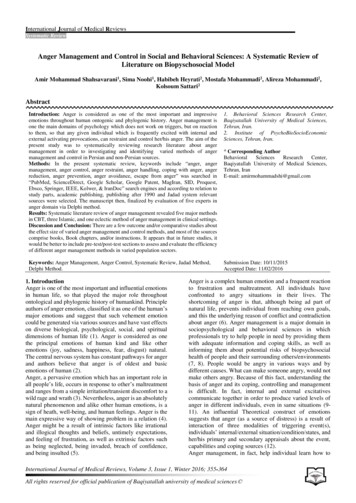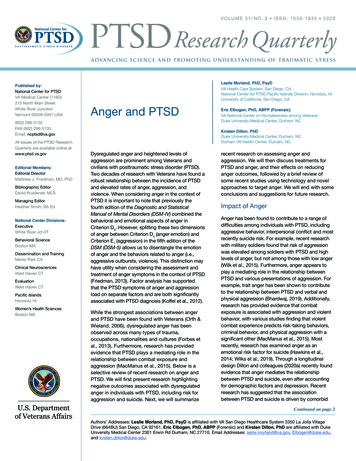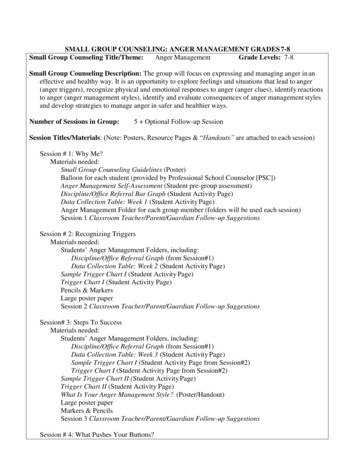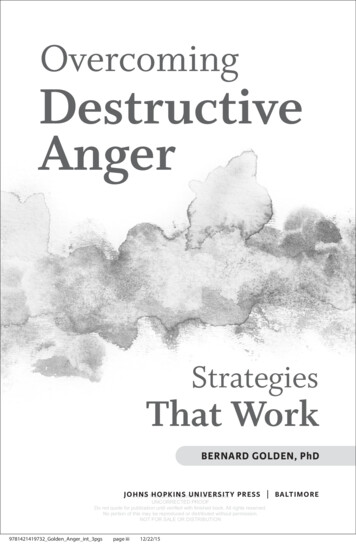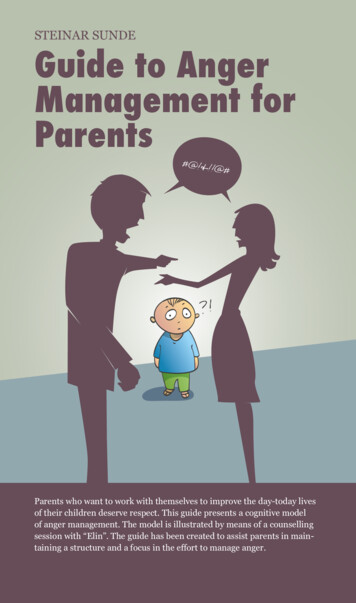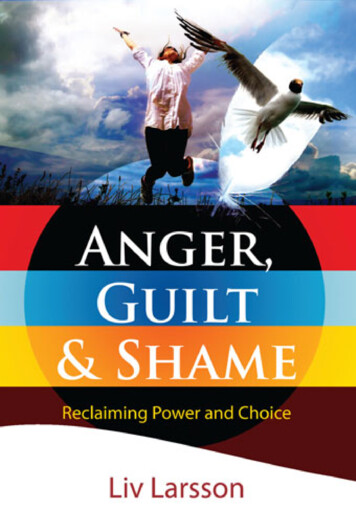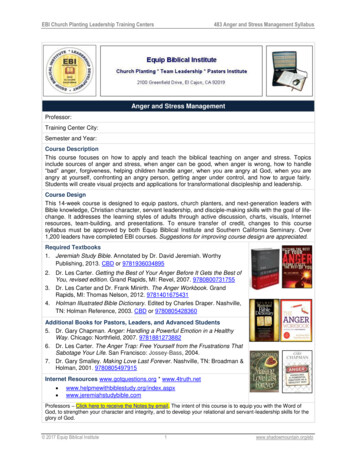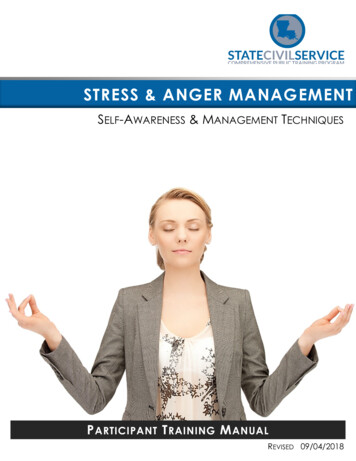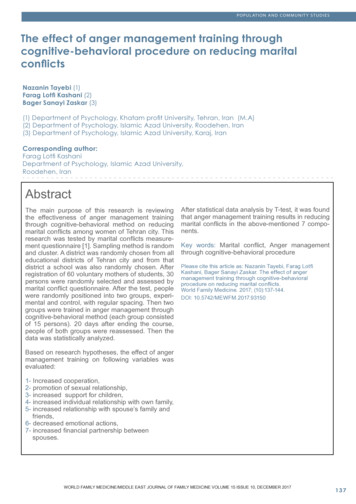
Transcription
P O P U L AT I O N A N D CO M M U N I T Y S T U D I E SThe effect of anger management training throughcognitive-behavioral procedure on reducing maritalconflictsNazanin Tayebi (1)Farag Lotfi Kashani (2)Bager Sanayi Zaskar (3)(1) Department of Psychology, Khatam profit University, Tehran, Iran (M.A)(2) Department of Psychology, Islamic Azad University, Roodehen, Iran(3) Department of Psychology, Islamic Azad University, Karaj, IranCorresponding author:Farag Lotfi KashaniDepartment of Psychology, Islamic Azad University,Roodehen, IranAbstractThe main purpose of this research is reviewingthe effectiveness of anger management trainingthrough cognitive-behavioral method on reducingmarital conflicts among women of Tehran city. Thisresearch was tested by marital conflicts measurement questionnaire [1]. Sampling method is randomand cluster. A district was randomly chosen from alleducational districts of Tehran city and from thatdistrict a school was also randomly chosen. Afterregistration of 60 voluntary mothers of students, 30persons were randomly selected and assessed bymarital conflict questionnaire. After the test, peoplewere randomly positioned into two groups, experimental and control, with regular spacing. Then twogroups were trained in anger management throughcognitive-behavioral method (each group consistedof 15 persons). 20 days after ending the course,people of both groups were reassessed. Then thedata was statistically analyzed.After statistical data analysis by T-test, it was foundthat anger management training results in reducingmarital conflicts in the above-mentioned 7 components.Key words: Marital conflict, Anger managementthrough cognitive-behavioral procedurePlease cite this article as: Nazanin Tayebi, Farag LotfiKashani, Bager Sanayi Zaskar. The effect of angermanagement training through cognitive-behavioralprocedure on reducing marital conflicts.World Family Medicine. 2017; (10):137-144.DOI: 10.5742/MEWFM.2017.93150Based on research hypotheses, the effect of angermanagement training on following variables wasevaluated:1- Increased cooperation,2- promotion of sexual relationship,3- increased support for children,4- increased individual relationship with own family,5- increased relationship with spouse’s family andfriends,6- decreased emotional actions,7- increased financial partnership betweenspouses.WORLD FAMILY MEDICINE/MIDDLE EAST JOURNAL OF FAMILY MEDICINE VOLUME 15 ISSUE 10, DECEMBER 2017M I D D L E E A S T J O U R N A L O F FA M I LY M E D I C I N E V O LU M E 7 , I S S U E 1 0137
P O P U L AT I O N A N D CO M M U N I T Y S T U D I E SIntroductionWhereas family is where love is focused and is constantprotective of different aspects of individual life and asthe infrastructure of forming this little social system iscouples’ relationships, the root of most conflicts whichare happened in marital life comes from establishing animproper relationship between couples, so relation skillsplay an important role in improving couples’ relationshipand consequently decreasing conflicts and adversaryproblems.Traditionally we see the family as a place where love,rapport and support can be attained, despite adversity,where humans can take a breath and prepare to fight theoutside world. But for millions of people with dysfunctionalfamilies, it is a fancy. Obviously no one intentionally wantsto make the family dysfunctional but families accept thatbecause they know no other way [2].Mental health, body health and family health are affected byconflicts. Many researchers have reviewed the relationshipbetween marital conflicts with depression anger, pepticdisorders and diseases such as cancer. Adverse relationsresult in children’s conflict with each other and with theirparents as well as cause lack of health and competence inthe relationship between family members [3].The major cause of spouses’ problems refers to theircognition and thinking. Cognitive-behavioral familyclinicians believe that spouses are affected by theirenvironment and their behaviors could be reformed throughproviding new educational methods, anger management,solving and controlling conflicts and so on. Throughholding group training by cognitive-behavioral method,they could be trained in the special behavioral purposeswhich are themselves designed for facing illogical thoughtsof spouses and other family members and directing thefamily to think in a new way.Carlos Darna [4] established the first longitude assessmentabout spouses’ training program. He wanted to know towhat extent the mental training courses could reinforcekindness. So 1,370 spouses from 5 different cities of theUSA participated in a training course and just after thatand also after 6-8 months after ending the course theywere assessed. It was concluded that kindness could beenhanced by training courses. His research showed thatthese courses have an extraordinary effect on sincerity,marital life matching, marital satisfaction and reducedconflicts and anger [5].One of the common problems which are considered bycouple therapists since a long time ago is marital conflict.This problem may have different forms and emerges informs of depression of one or both spouses, addiction,conduct disorder of children, misbehavior and verbalabuses and physical violence which finally results indivorce [6, 7, 8].Organization for Civil Registration in Iran shows that withinthe latest decades divorce and marital dissatisfaction areincreasing. Reflecting on this matter, it is totally obvious forfuture generations. The experience of unexpressed andlong-term anger could have harmful and consequencesduring the first years of marriage and even results instruggle, anger, isolation and finally divorce [9, 10].All humans are willing to gleefully pass the rough path oflife and by using any possible way and skill give it a newcolor when they feel that lost their happiness. Accordingto behaviorism therapists, abnormal behaviors of couplescome from feedback processes between them who theirpositive performance shall sometimes be increased bygaining and keeping cognitive-behavioral skills suchas anger management, aggression management, loveexpression and proper decisions as well as they can findthe proper path [11].Research purpose and hypothesesThe major orientation of the present research is inspiredfrom cognitive-behavioral procedure especially behavioralmodel which is related to anger management in maritalconflicts because assisting spouses to reach a better lifeplays an important role in the mental health of the society.According to conflict statistics, there is a wide range ofdisorders from marital relationship to reduced spousalcooperation, reduced sexual relationship, increasedemotional reactions, reduced family relations withspouse’s family, increased relationship with own familyand separating financial affairs.Main hypothesisAnger management training through cognitive-behavioralprocedure is effective in reducing marital conflicts.Sub-hypothesesI Anger management training through cognitivebehavioral procedure is effective on increasing spouses’cooperation.II Anger management training through cognitivebehavioral procedure is effective on increasing sexualsatisfaction.III Anger management training through cognitivebehavioral procedure is effective on reducing emotionalreactions.IV Anger management training through cognitivebehavioral procedure is effective on increasing supportfor children.V Anger management training through cognitivebehavioral procedure is effective on increasingrelationship with spouse’s family and friends.VI Anger management training through cognitivebehavioral procedure is effective on increasing individualrelationship with own family.VII Anger management training through cognitivebehavioral procedure is effective on improving financialpartnership between spouses.Statistical and Population Information Dept. of National138WORLD FAMILY MEDICINE/MIDDLE EAST JOURNAL OF FAMILY MEDICINE VOLUME 15 ISSUE 10, DECEMBER 2017M I D D L E E A S T J O U R N A L O F FA M I LY M E D I C I N E V O LU M E 7 , I S S U E 1 0
P O P U L AT I O N A N D CO M M U N I T Y S T U D I E SDefinition of research variablesA. Theoretical definition of anger managementThis skill enables a person to recognize anger insidethemselves and in others and knowing its effects onbehavior can provide a more proper reaction to thisemotion [12, 13].Anger management skill is an initiated cognitive-behavioralprocess by which people can determine, discover or inventsolution strategies for daily problems.B. Theoretical definition of marital conflictMarital conflict is any struggles in marital life which causeimbalance in establishing a positive marital relationship.Sampling method and sample volumeThe method of sampling is random and multiphase clustersampling. Firstly district No. 6 was randomly selectedamong all Tehran educational districts, and then oneschool was selected from all schools of district No. 6. Itwas announced that in this school would be held somecourses under the title of “Anger Management Training”within 8-10 sessions and as the goal of this training wasmarried mothers in Tehran, the mothers with the followingterms could voluntary register (fathers were not selectedas the research population because they didn’t participateand actively attend in training classes):12345-Being housewife (not working outside of home)Age between 25 and 45Married just onceHaving at least one childMinimum of 5 years marriageAfter announcement, 60 people registered voluntarily.Among the applicants, 30 mothers were randomly chosenand assessed by marital conflict pretest [1]. Then torandomly place people into the two groups (experimentaland control), we put 15 people in the control group and 15 inthe experimental group and then one of the groups, as theexperimental group, were tested for anger managementskills.Research toolsThe tools of this research are marital conflict questionnaires[1]. Marital conflict questionnaire (MCQ) has been providedby Dr. Bagher Sanayi and Tahereh Barati according toclinical experiments in Iran. Its purpose is testing conflictsbetween husbands and wives and its main dimensions.This questionnaire has been distributed in a 111-persongroup consisting of 53 males and 58 females who referredto judicial authorities and/or consulting centers to removetheir marital conflicts where a 108-person group consistedof ordinary couples (53 males and 55 females). Theevidence group was chosen among MA students of Tehrancity and employees who took or did not take a high schooldegree and who were working in Tehran educationaldistrict 2. In this tool, the higher score the more conflictand the lower score the less conflict and the better therelationship.Research validity: Cronbach’s alpha for the wholequestionnaire on a 32-person group is 53% and its sevensubscales are as follows:Reduced cooperation 30%, reduced sexual relationship50%, increased emotional reactions 73%, increasedsupport for child 60%, increased individual relationship withown family 64%, decreased family relations with spouse’sfamily and friends 64%, separated financial affairs (meanseach spouses took control of their own budget) 51% [1].Data analysis methodIn this research independent T-test was used. This test wasdone to compare means of pretest and after-test scores ofgroups. SPSS was applied to data analysis.Data Results1. Data descriptionTable 1: Frequency and percentage of marriage age of applicants based on experimental and control groupsWORLD FAMILY MEDICINE/MIDDLE EAST JOURNAL OF FAMILY MEDICINE VOLUME 15 ISSUE 10, DECEMBER 2017M I D D L E E A S T J O U R N A L O F FA M I LY M E D I C I N E V O LU M E 7 , I S S U E 1 0139
P O P U L AT I O N A N D CO M M U N I T Y S T U D I E STable 2: Frequency and percentage of marriage duration of applicants based on experimental and controlgroupsTable 3: Frequency and percentage of number of children of applicants based on experimental and controlgroupsTable 4: Frequency and percentage of spouse’s marriage age of applicants based on experimental and controlgroupsTable 5: Frequency and percentage of financial situation of family of applicants based on experimental and controlgroups2.Data inferential analysisTable 6: Levene’s F-test to review equivalent of variances140WORLD FAMILY MEDICINE/MIDDLE EAST JOURNAL OF FAMILY MEDICINE VOLUME 15 ISSUE 10, DECEMBER 2017M I D D L E E A S T J O U R N A L O F FA M I LY M E D I C I N E V O LU M E 7 , I S S U E 1 0
P O P U L AT I O N A N D CO M M U N I T Y S T U D I E SAccording to level of significance of Levene’s test in marital conflicts scales and in all scales which is higher than 0.05,Levene’s F-test null hypothesis (variances of two groups are equal) was confirmed in all scales except decreasedindividual relationship with own family. According to calculated level of significance related to above variable, as theP 0.024 which is lower than error level of 0.05 the Levene’s F-test null hypothesis was rejected.Table 7: T-test of independent groups to review difference of means of pre-test scores for marital conflicts andits subscalesConflicts scores and all their components except increased emotional reactions are higher than error level of 0.05 andthe difference of means is not significant. So it can be said that the two experimental and control groups are almost at thesame level in terms of marital conflicts except in the component of increased emotional reactions in pretest stage andafter holding training sessions of anger management through cognitive-behavioral method.Table 8: Levene’s F-test to review equivalent of variancesAll scores of Levene’s F-test levels of significance related to marital conflicts (P 0.129), decreased cooperation (P 0.441),increased emotional reactions (P 606), increased support for child (P 0.884), increased individual relationship with ownfamily (P 0.729), decreased family relations with spouse’s family and friends (P 0.68) and separated financial affairs(P 0.213) are higher than 0.05 and in these scores Levene’s F-test null hypothesis (variances of both groups are equal)was confirmed.WORLD FAMILY MEDICINE/MIDDLE EAST JOURNAL OF FAMILY MEDICINE VOLUME 15 ISSUE 10, DECEMBER 2017M I D D L E E A S T J O U R N A L O F FA M I LY M E D I C I N E V O LU M E 7 , I S S U E 1 0141
P O P U L AT I O N A N D CO M M U N I T Y S T U D I E SRegarding level of significance of decreased sexual relationship (P 0.033) which is lower than 0.05, Levene’s F-testfirst hypothesis (variances of both groups are not equal) was confirmed.Main hypothesis: Anger management training influences decreasing marital conflicts.Table 9: T-test of independent groups to review differential means of two groups (experimental and control)for marital conflictsCalculated T (t -3.78, df 28) in error level of 0.05 is significant and with confidence coefficient of 95% the nullhypothesis of the research is rejected. So the observed difference between differential means of scores is notstochastic and it could be said that anger management training through cognitive-behavioral method was effective indecreasing marital conflicts.First sub-hypothesis: Anger management training is effective in improving frequency of sexual relations.Table 10: T-test of independent groups to review difference of differential means of two groups (experimentaland control) for sexual relationshipCalculated T (t -3.25, df 28) in error level of 0.05 is significant and with confidence coefficient of 95% the nullhypothesis of the research is rejected. So the observed difference is not stochastic and it could be said that angermanagement training through cognitive-behavioral method was effective in improving frequency of sexual relations.Second sub-hypothesis: Anger management training influences support for child.Table 11: T-test of independent groups to review difference of differential means of two groups (experimentaland control) for support for childrenCalculated T (t -0.274, df 28) in error level of 0.05 is not significant and the null hypothesis of the research isconfirmed. So it could be said that anger management training through cognitive-behavioral method had no effect onincreased support for children.Third sub-hypothesis: Anger management training influences decreasing individual relationship with own family.Table 12: T-test of independent groups to review difference of differential means of two groups (experimentaland control) for individual relationship with own familyCalculated T (t 2.55, df 28) in error level of 0.05 is significant and with confidence coefficient of 95% the nullhypothesis of the research is rejected. So it could be said that anger management training through cognitivebehavioral method was effective in decreasing individual relationship with own family.142WORLD FAMILY MEDICINE/MIDDLE EAST JOURNAL OF FAMILY MEDICINE VOLUME 15 ISSUE 10, DECEMBER 2017M I D D L E E A S T J O U R N A L O F FA M I LY M E D I C I N E V O LU M E 7 , I S S U E 1 0
P O P U L AT I O N A N D CO M M U N I T Y S T U D I E SFourth sub-hypothesis: Anger management training influences decreasing family relations with spouse’s family andfriends.Table 13: T-test of independent groups to review difference of differential means of two groups (experimentaland control) for relationship with spouse’s family and friendsCalculated T (t 1.70, df 28) in error level of 0.05 is not significant and the null hypothesis of the research is confirmed.So it could be said that anger management training through cognitive-behavioral method had no effect on decreasingfamily relation with spouse’s family and friends.Fifth sub-hypothesis: Anger management training influences increasing financial partnership between spouses.Table 14: T-test of independent groups to review difference of differential means of two groups (experimentaland control) for financial partnershipCalculated T (t 0.65, df 28) in error level of 0.05 is not significant and null hypothesis of the research is confirmed. So itcould be said that anger management training through cognitive-behavioral method had no effect on increasing financialpartnership between spouses.Sixth sub-hypothesis: Anger management training influences increasing emotional reactions.Table 15: T-test of independent groups to review difference of differential means of two groups (experimentaland control) for emotional reactionsCalculated T (t 7.46, df 28) in error level of 0.05 is significant and with confidence coefficient of 95% the null hypothesisof the research is rejected. So the observed difference between differential means of scores is not stochastic and it couldbe said that anger management training through cognitive-behavioral method was effective in increasing emotionalreactions.Seventh sub-hypothesis: Anger management training influences increasing cooperation between spouses.Table 16: T-test of independent groups to review difference of differential means of two groups (experimentaland control) for spouses’ cooperationCalculated T (t 3.42, df 28) in error level of 0.05 is significant and with confidence coefficient of 95% the null hypothesisof the research is rejected.WORLD FAMILY MEDICINE/MIDDLE EAST JOURNAL OF FAMILY MEDICINE VOLUME 15 ISSUE 10, DECEMBER 2017M I D D L E E A S T J O U R N A L O F FA M I LY M E D I C I N E V O LU M E 7 , I S S U E 1 0143
P O P U L AT I O N A N D CO M M U N I T Y S T U D I E SResults interpretationMarkman et.al [14] provided a report for a 5-year review interms of assessing effect of prevention from marital distressby conflict control training. This assessment included a 5session program of life skill and conflict control training.Within 5 years follow up in comparing with control group,trained couples showed higher level of positive relationskills and lower negative relation skills and violence.Lange and Butler et.al [15, 16] reviewed the effect ofanger self-management training in dysfunctional couples.They asked 9 couples to write to their spouses ratherthan express their anger. The results showed remarkableimprovement in anger management of couples againsteach other [6].Haji Abolzadeh [17] in research under the title of “Theeffect of relation skills training through cognitive-behavioralprocedure on the rate of marital conformity of couples whoresiding at Karaj city” and concluded that life skills trainingsuch as anger management, effective conversation,solving the problems and innovative thinking throughcognitive-behavioral method influence conformity rate ofcouples. They believe that anger management skills are ofthe most important in this matter.In a research under the title of “The effects of angermanagement training on preventing delinquency of childrenfrom maladaptive families in Tehran City”, anger andviolence were mentioned as factors which cause violenceand aggression in maladaptive families. This emotion couldbe trained and control by cognitive-behavioral methodwhich will reduce conflicts among family and children [18,19].Finally it is concluded that three hypotheses of supportfor children, relation with spouse’s family and friendsand increased financial partnership are not confirmed.Because the research hypotheses have been reviewedas a major hypothesis and seven sub-hypotheses and itwas shown that this training was powerful in other subhypotheses, it can be concluded that anger managementtraining through cognitive-behavioral procedure influencesreducing marital conflicts.[6] Farahbakhsh, K.; Shafi Abadi, A. et al; “Comparingthe effects of marital counseling effectiveness in Ellis’scognitive approach, Glasser’s reality therapy and theircombination on decreasing marital conflicts”; IranConsulting Association Scientific and Research; Summer2006[7] Bandura, A. (1989); “Human agency in social cognitivetheory”; American Psychologist[8] Burns, D. D. (1999); “Feeling good”; New Americanlibrary, New York[9] Divorce and its’ consequences; Social affairs journal;7th Ed., June 2005[10] Ellis, A. (2003); “The nature of disturbed maritalinteractions”; Journal of Rational-Emotive and CognitiveBehavior Therapy[11] Epstein, S. (1992); “Coping ability, negative selfevaluation, and overgeneralization: Experiment andtheory”; Journal of personality[12] Eidelson, RJ. &Epstein, N. (1982); “Cognition andrelationship maladjustment: Development of a measure ofdysfunctional relationship beliefs”[13] Ellis, A. (1980); “Rational-emotive therapy andcognitive behavior therapy: Similarities and differences”[14] Golman, D. (1998); “Emotional intelligence Bantam”[15] Lange, E. J. (1990); “Exercise self-schemata: cognitiveand behavioral correlates, health psychology”; 69-82[16] Butler, A. C. & Chapman, J. E. & Forman, E. M & Beck,A. T. (2006); “The empirical status of cognitive-behavioraltherapy: a review of meta-analyses”[17] Haji Abolzadeh, N., 2002; “Review of the effect ofrelation skills training with cognitive-behavior procedure”;Faculty guidance and consulting; Alzahra University,Educational and Psychology Sciences faculty[18] Davoudi, J. (2001); “Comparing individual consultingby emphasizing on rational-emotional procedure ondecreasing irrational believes between 14-18 years oldcriminals”; MA thesis; Teacher Education university[19] San Francisco bay Area Centre for cognitive therapy.(2007), excessive anger, www.S.F.B.A.C.C.T.COMReferences[1] Sanayi, B. (2000); “Scales of family and marriagemeasurement”; Tehran, Besat publication[2] Alexander, J & Parson, B. (1973); “Short term behaviorintervention with delinquent”; Family journal of abnormalpsychology[3] Ackerman .N .W. (1966); “Treating the troubled family,New York: Basic Books”[4] Beck, J. S. (1997); “Cognitive therapy: Basic andbeyond”; Journal of Psychotherapy Practice andResearch[5] Beck, J. S. (2011); “Cognitive behavior therapy: Basicsand beyond”144WORLD FAMILY MEDICINE/MIDDLE EAST JOURNAL OF FAMILY MEDICINE VOLUME 15 ISSUE 10, DECEMBER 2017M I D D L E E A S T J O U R N A L O F FA M I LY M E D I C I N E V O LU M E 7 , I S S U E 1 0
A. Theoretical definition of anger management This skill enables a person to recognize anger inside themselves and in others and knowing its effects on behavior can provide a more proper reaction to this emotion [12, 13]. Anger management skill is an initiated cognitive-behavioral process by which people can determine, discover or invent

